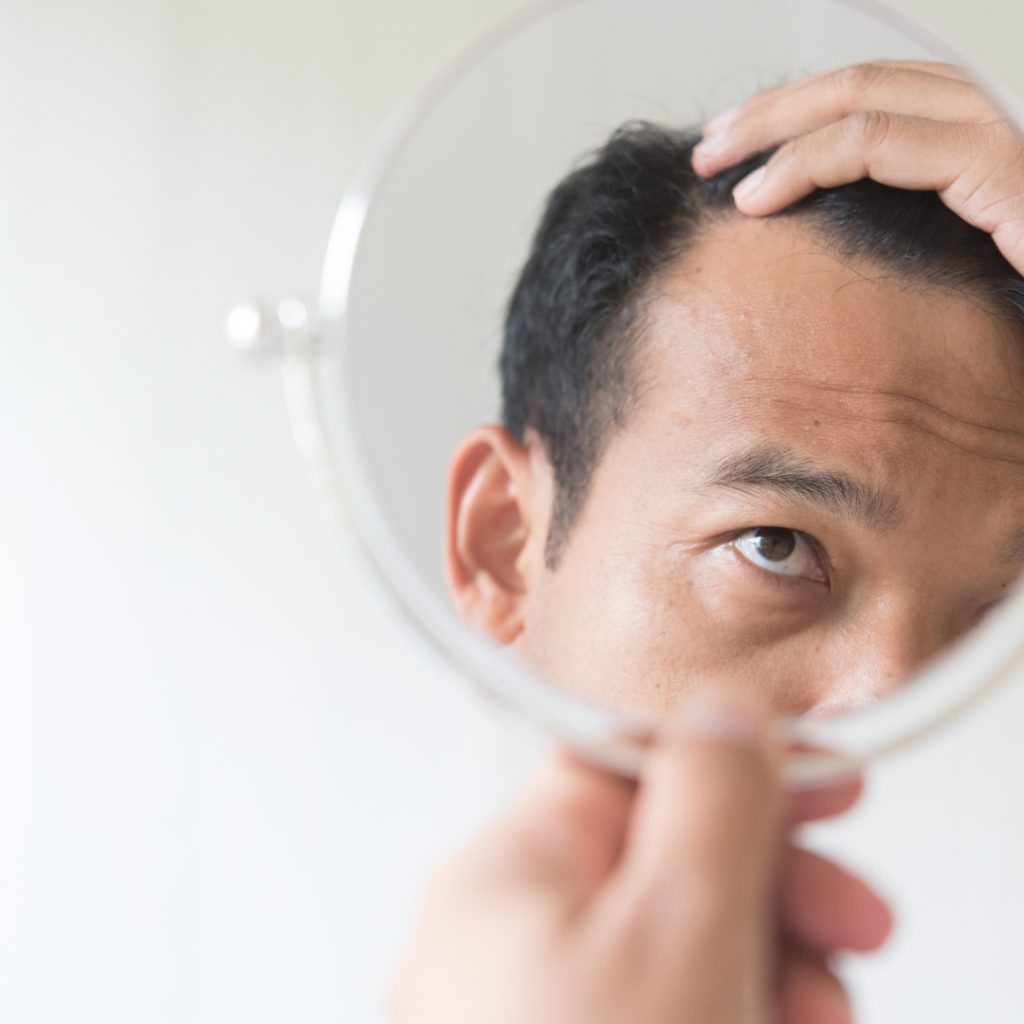
Mane Concerns: Understanding Hair Loss
Understanding Hair Growth and Loss
In the spirit of August as National Hair Loss Awareness Month, we’d like to enlighten you about the reasons for hair loss, how it can be managed, and more.
Hair growth and loss are natural processes that everyone experiences. While the cycle of hair growth includes periods of shedding and regrowth, understanding these phases can help us better manage our hair health.
Hair growth occurs in three stages: anagen (growth phase), catagen (transitional phase), and telogen (resting phase). Each hair follicle cycles through these phases, ensuring continuous hair renewal. However, when shedding outpaces growth, the result is alopecia (or hair loss), which can affect your self-esteem and appearance.
There are many types of hair loss, the most common being androgenic alopecia, alopecia areata, telogen effluvium, and anagen effluvium. Hair loss can occur anywhere on the body, but it most commonly affects the scalp.
(If you are experiencing burning, itching, or scalp irritation, excessive daily shedding, loss of hair on your body as well as your scalp, or sudden loss of large amounts of hair, you should contact your doctor.)
The Difference Between Hair Loss in Men and Women
More than 80% of men and 50% of women experience significant hair loss during their lifetime.
Hair loss in men generally begins with a receding hairline and thinning at the crown, eventually leading to baldness. Women typically experience a thinning over the entire scalp, maintaining the hairline.
Women are more likely to experience temporary hair loss due to hormonal changes and stress, while men more commonly experience permanent hair loss due to genetic factors.
Hair Loss Causes
Hair loss can stem from a multitude of causes, each influencing the hair growth cycle differently. These include:
- Family history (genes inherited from your parents)
- Hormonal changes (experienced during pregnancy, menopause, or thyroid imbalances)
- Medical conditions (autoimmune diseases, scalp infections, and severe illnesses)
- Medical treatment (chemotherapy and certain medications)
- Stressful events
- Hairstyle and treatments (tight hairstyles and harsh chemical treatments)
Risk factors that increase the risk of hair loss also include age, significant weight loss, and poor nutrition.
Diagnosing Hair Loss
Before making a diagnosis, your doctor will typically perform a physical exam and ask about your diet, hair-care routine, and medical and family history.
Tests may also be performed, including:
- Blood test: May help uncover medical conditions that can cause hair loss.
- Pull test: Several dozen hairs are gently pulled to see how many come out. This helps determine the stage of the shedding process.
- Scalp biopsy: Samples are scraped from the skin or from a few hairs plucked from the scalp to examine the hair roots under a microscope, determining whether an infection is causing hair loss.
- Light microscopy: A special instrument is used to examine hairs trimmed at their basis, helping to uncover possible disorders of the hair shaft.
Hair Loss Prevention and Treatment
Most often, correcting the underlying problem is what’s needed to help stop hair loss if it is caused by medication, hormonal imbalances, thyroid problems, or diet.
Most hair loss treatments are meant to help with androgenic alopecia (male and female pattern hair loss), including:
- Medication
- Hair Transplant surgery
- Platelet-rich plasma (PRP)
 Although not all alopecia can be prevented, there are steps you can take to keep your hair healthy and minimize loss, such as:
Although not all alopecia can be prevented, there are steps you can take to keep your hair healthy and minimize loss, such as:
- Eat a healthy diet with enough calories, protein, and iron.
- Find ways to cope with stress.
- Manage thyroid disease or other medical conditions affecting hair loss.
- Avoid hairstyles that pull hair tightly.
- Try a cooling cap if undergoing chemotherapy.
- Take clinically tested hair growth supplements, like Nutrafol (available at Waccamaw Dermatology offices), and use essential oils.
Avoid “Miracle Cures”
When dealing with hair loss, it’s crucial to be wary of so-called miracle cures that promise instant results. Many of these products and treatments lack scientific backing and can be expensive, ineffective, and potentially harmful. Rather than relying on quick fixes, focus on proven methods supported by research and recommended by healthcare professionals, like us here at Waccamaw. By avoiding miracle cures and adopting a more informed and cautious approach, you can prevent potential disappointments and safeguard your health while addressing hair loss concerns.
Navigating the complexities of hair loss can be challenging, but with the right knowledge and resources, you can take control of your hair health journey. If you are struggling with alopecia, contact Waccamaw Dermatology, and let us help you embrace your experience, manage hair loss effectively, and maintain your confidence!
Coping with Hair Loss
Dealing with the loss of your hair can be an emotional journey, but there are ways to help manage your struggles. Accepting the changes and focusing on self-compassion is essential. Remember, your hair does not define your worth or beauty. Connecting with friends, family, and support groups can provide comfort. Try exploring different hairstyles, wigs, or seek head coverings to help boost your confidence. Consider seeking professional counseling to help to address underlying emotional distress.
Embracing a healthy lifestyle, including regular exercise and a balanced diet, can help to improve overall well-being and promote a positive outlook. Finding ways to adapt and celebrate your unique self can transform the experience into an empowering journey!
If you have questions about hair loss, come talk to the providers at Waccamaw Dermatology Skin Institute. We’ll help you find the root causes (no pun intended) and recommend the best course of action for keeping your hair as full and healthy as possible.
Featured
- Mane Concerns: Understanding Hair Loss
Aug 21, 2024
- What is Contact Dermatitis?
Jul 18, 2024
- June is Acne Awareness Month
May 31, 2024
- Benefits of Individualized Skin Cancer Treatment
May 7, 2024
- Busting Myths About Fillers and Injectables
Apr 18, 2024
- Keep Retinol in Your Winter Skincare Routine – Waccamaw Dermatology Skin Institute
Jan 12, 2024
- Waccamaw Dermatology Skin Institute Holiday Gift Guide
Dec 13, 2023
- Our Not-So-Secret Summer Skincare Tips
Jul 11, 2023
- Spring Skincare Tips to Restore Your Skin
Mar 21, 2023
- Six Undeniable Benefits of Botox
Mar 1, 2023